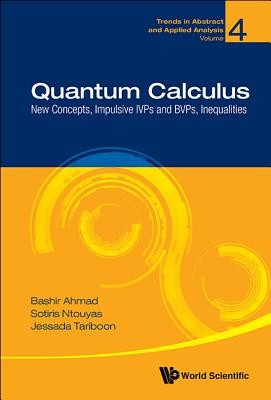
- We will send in 10–14 business days.
- Author: Bashir Ahmad
- Publisher: World Scientific Publishing Company
- Year: 2016
- Pages: 288
- ISBN-10: 9813141522
- ISBN-13: 9789813141520
- Format: 15.5 x 23.1 x 2 cm, kieti viršeliai
- Language: English
- SAVE -10% with code: EXTRA
Quantum Calculus: New Concepts, Impulsive Ivps and Bvps, Inequalities (e-book) (used book) | bookbook.eu
Reviews
Description
The main objective of this book is to extend the scope of the q-calculus based on the definition of q-derivative [Jackson (1910)] to make it applicable to dense domains. As a matter of fact, Jackson's definition of q-derivative fails to work for impulse points while this situation does not arise for impulsive equations on q-time scales as the domains consist of isolated points covering the case of consecutive points. In precise terms, we study quantum calculus on finite intervals.In the first part, we discuss the concepts of qk-derivative and qk-integral, and establish their basic properties. As applications, we study initial and boundary value problems of impulsive qk-difference equations and inclusions equipped with different kinds of boundary conditions. We also transform some classical integral inequalities and develop some new integral inequalities for convex functions in the context of qk-calculus. In the second part, we develop fractional quantum calculus in relation to a new qk-shifting operator and establish some existence and qk uniqueness results for initial and boundary value problems of impulsive fractional qk-difference equations.
EXTRA 10 % discount with code: EXTRA
The promotion ends in 23d.05:17:25
The discount code is valid when purchasing from 10 €. Discounts do not stack.
- Author: Bashir Ahmad
- Publisher: World Scientific Publishing Company
- Year: 2016
- Pages: 288
- ISBN-10: 9813141522
- ISBN-13: 9789813141520
- Format: 15.5 x 23.1 x 2 cm, kieti viršeliai
- Language: English English
The main objective of this book is to extend the scope of the q-calculus based on the definition of q-derivative [Jackson (1910)] to make it applicable to dense domains. As a matter of fact, Jackson's definition of q-derivative fails to work for impulse points while this situation does not arise for impulsive equations on q-time scales as the domains consist of isolated points covering the case of consecutive points. In precise terms, we study quantum calculus on finite intervals.In the first part, we discuss the concepts of qk-derivative and qk-integral, and establish their basic properties. As applications, we study initial and boundary value problems of impulsive qk-difference equations and inclusions equipped with different kinds of boundary conditions. We also transform some classical integral inequalities and develop some new integral inequalities for convex functions in the context of qk-calculus. In the second part, we develop fractional quantum calculus in relation to a new qk-shifting operator and establish some existence and qk uniqueness results for initial and boundary value problems of impulsive fractional qk-difference equations.


Reviews